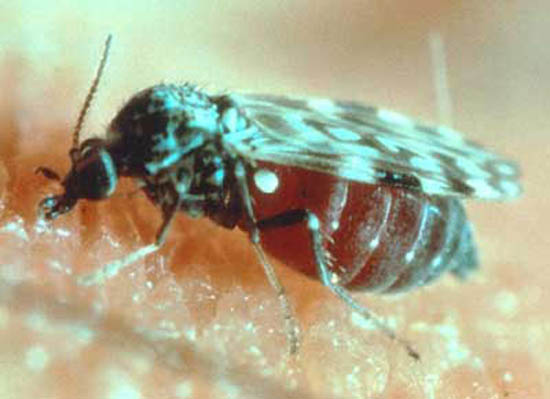A RARE combination of wet weather followed by intense heat means Scots are in for the worst midge season for six years.
Dr Alison Blackwell, who runs the Scottish Midge Forecast, says the recent weather conditions have led to significant increases in the numbers of the biting bloodsuckers being recorded.
As well as large numbers of midges, a rare third wave of the pests could be on the cards, stretching out the torment until the end of September.
The damp spring weather combined with the recent hot temperatures has provided the ideal reproductive conditions for midges.
Dr Blackwell has run an online forecast for the past 10 years which gauges the numbers of midges at various sites across Scotland.

She says this summer could see some of the highest numbers of midges recorded since the summer of 2011.
She said: “At the moment we’re looking at a big summer.
“It all depends on the weather. It needs to be warm and wet but at the moment, it’s shaping up to be the biggest summer for midges for five or six years.
“The warm weather is ideal for them and will likely lead to increased numbers.”
She continued: “About five years ago it was a really good summer for the midges but the data we have collected so far suggests that it could be even bigger this summer across the country.
“It’s too soon to put a figure on it but I’d expect to see a significant increase in the numbers from last year.
There are 48 different types of midge in Scotland but it is the 3mm long Highland midge that commonly causes problems for Scots in the summer months.
Only the females actually bite however hill-walkers and golfers will have to have the insect repellent at the ready if the warm weather conditions continue throughout the summer.
Dr Blackwell said: “The recent warm weather has brought more out after the first emerged following the wet weather we had a couple of weeks ago.
“In mid-July we should see a new, second wave of midges because the ones right now are currently mating.”
Last year, the midge season was delayed by two weeks due to cooler temperatures in May.
However, there were still 4,140,064 midges recorded at one site in Crarae, Argyll, and 2,353,896 in Crarae, Argyll.
There is a chance that these numbers will significantly increase this year thanks to a rare, ‘third wave’ of midges caused by the warm weather.
Dr Blackwell said: “We could even see a third wave of midges but it all depends on the weather. We would need the conditions to be perfect all the way up to September.
“If we do get a third generation, it will stretch the midge season into late September.
“Usually, if you only get two generations, then the midge season tends to end by the end of August.
“So far, the conditions have been ideal and it’s started off as a bumper season, however. the next few weeks of weather will determine how big the summer will be.”
Dr Blackwell operates the national Midge Forecast, which predicts number of midges we will see in a year through the use of traps set up at various locations by volunteers.
The forecast has been running for ten years and ranks an area’s midge levels on a scale from one to five.
The Scottish tourism industry is estimated to lose nearly £286 million-a-year as people are put off by the biting insects.
A midge can live for between two days and two weeks depending on how favourable the weather conditions are.
